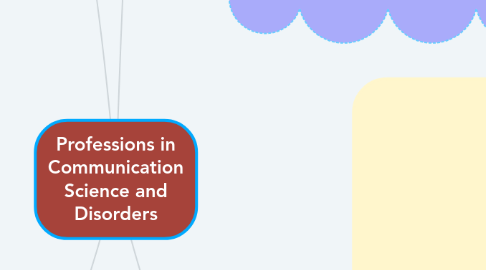
1. Speech-Language and Hearing Scientists
1.1. extend our knowledge of human communication processes and disorders.
1.1.1. Explore the anatomy, physiology, and physics of speech and sound production.
1.1.2. develop computerized speech used in telephone answering systems, & for individuals who can not speak
1.1.3. investigate the causes, prevention, and treatment of different speech disorders
1.1.4. study the relationships of different languages and the ways children learn their native tongue
1.1.5. explore the variations of present day English dialects and how language is changing
1.1.6. study the nature of language disorders in children and adults.
1.1.7. create and improve listening devices like hearing aids and telephone amplifiers to help people who are hard of hearing
1.1.8. develop ways for testing infants and those with severe physical or psychological impairments
1.2. Doctorate Degree (PhD or an EdD.)
1.2.1. work at universities, government agencies, industry, and research
2. Professional Aides/Assistants
2.1. partake in clerical tasks and assist a SLP with the preparation of assessment and treatment materials
2.2. conduct screenings, participate in calibration of audiological instrumentation,
2.3. work under the supervision of a SLP or Audiologist
2.4. not permitted to perform interpretation of test results, service plan development, family/client counseling, or determination of when to discharge a client from treatment, like SLP
2.5. Usually obtain associate’s or bachelor’s degree with certain curriculum requirements
3. Speech-Language Pathologist (SLP)
3.1. Identify, assess, treat, prevent speech/communication disorders
3.1.1. May be Developmental or Acquired after a brain injury, illness, or surgery
3.1.1.1. Swallowing Disorders
3.1.1.1.1. client has trouble sucking, chewing, and swallowing food and liquid
3.1.1.2. Cognitive Communication Disorders
3.1.1.2.1. ex. Autism
3.1.1.3. Speech Disorders
3.1.1.3.1. client has difficulty producing speech sounds and putting words together correctly or fluently
3.1.1.4. Language Disorder
3.1.1.4.1. client has trouble understanding others, or sharing thoughts, ideas, and feelings
3.1.1.5. Social Communication Disorder
3.1.1.5.1. client has trouble with the social use of verbal and nonverbal communication
3.2. Masters/Doctoral Degree in SLP
3.2.1. Complete 25 hours of clinical observation, 9 months of paid clinical experience, 350 hrs of clinical practice, and pass the National Exam (NTE), CEUs
3.2.1.1. State Licensure
3.2.1.1.1. Work in Private practice, Hospitals/rehabilitation centers, Clinics
3.2.1.2. Certificate of Clinical Competence in Speech-Language Pathology (CCC-SLP)
3.3. Bachelors/Masters Degree in SLP
3.3.1. Student teaching experience,Pass National Teaching Exam (NTE), 1-2 years experience in school setting
3.3.1.1. Public School Certification
3.3.1.1.1. Clinical practice within a School
4. Audiologist
4.1. Prevent, diagnose, and treat hearing and balance disorders
4.1.1. Hearing Loss
4.1.1.1. Conductive, Sensorinueral, and mixed hearing loss
4.1.1.1.1. Mild to severe or bilateral/unilateral hearing loss
4.1.2. Hearing Aides/Assistive Technology (ex. Cochlear implants)
4.1.2.1. Helps in localizing the direction of sounds, Improves listening in loud environments, Creates better overall hearing
4.1.2.1.1. Audiologist selects custom-fit hearing aids and assistive technology for client
4.1.3. Dizziness and Balance
4.1.3.1. symptoms include: blurred vision, vertigo, staggering walk, nausea, faintness, changes in blood pressure, etc.
4.1.3.1.1. Audiologist evaluates and treats balance problems.
4.1.4. Hearing Screening and Testing
4.1.4.1. Screen individuals to identify possible hearing disorders.
4.1.4.1.1. Infants/ Toddlers
4.1.4.1.2. Older Chlildren/ Adults
4.1.5. Noise and Hearing Loss Prevention
4.1.5.1. Audiologist explains how to protect hearing from the effects of noise
4.1.6. Tinnitus or "Ringing of Ears"
4.1.6.1. can be caused by Hearing loss, Ménière's disease, exposure to Loud noise , Migraines, Head injury, Drugs, Anemia, Hypertension Stress, excess wax in the ear, Too much coffee, or Smoking
4.1.6.1.1. Audiologist advises people about how to treat and cope with ringing in the ears.
4.2. Doctoral Degree in Audiology (Aud.D)
4.2.1. Audiology license
4.2.2. Certificate of Clinical Competence in audiology (CCC-a)

